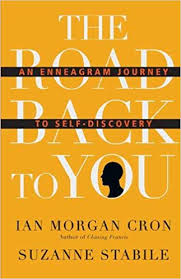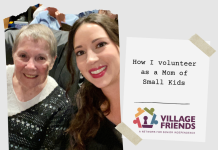This year I was invited to join a summer book club by a mom I’d met at the gym. I was just excited that she’d thought to invite me and wanted the opportunity to hang out with other women, so I didn’t particularly care what we read. Turns out, the book was The Road Back to You: An Enneagram Journey to Self-Discovery by Ian Morgan Cron and Suzanne Stabile. I’ll admit, I groaned a bit. Don’t get me wrong, I love a good personality test. My degree is in Psychology after all. I’ve done lots of them – Myers-Briggs, The Big Five, Buzzfeed’s Tell Us Your Favorite Song and We’ll Well You What Kind of Cheese You Are Quiz… Y’all know you’ve done those. I just thought this would be like any of the other personality tests I’d taken. Cool, I’m an ISTJ and Gouda. Good to know. 
When I started reading the introduction, one of the first things I noticed was that the authors explicitly rejected the notion that the Enneagram was the be all end all of personality, and that your Enneagram type was your destiny. Instead, they encouraged readers to use it as a tool to help them understand themselves and others. I softened a little. Who couldn’t use more tools to help them grow as a person? For those who don’t know anything about the Enneagram (i.e. me before reading this book), it is a “model of the human psyche which is principally understood and taught as a typology of nine interconnected personality types” (the Greek word “ennea” means nine). Thanks, Wikipedia.
Instead of taking a quiz, the authors suggest that you read each chapter to see what personality “type” you most identify with, because your type is more about motivations for doing things rather than the behaviors themselves. Three different types could have the same outward behavior but they would all be doing it for a different reason. Each type, 1-9, had its own chapter, but they weren’t in numerical order. They were grouped in “Triads” based on what emotion they were unhealthily focused on – anger, fear, or shame. Now it was getting more complicated. (I was all, “Someone just tell me what number I am, so I can skip to that chapter.”) The first three types–Eight, Nine, and One–were the Anger or Gut triad. I read the chapters on type Eight, the Challenger, and type Nine, the Peacemaker. I could identify with some aspects of both of those types, but neither fit me quite right. Then I got to the next chapter, type One, also known as the Perfectionist. I guessed that would be my type, because I am a self described perfectionist, but I was not prepared for the accuracy of what I read. Ooh, boy.
I had a diary when I was a little kid, and I thought that diaries were where you wrote down all your secrets. So that’s what I did. Justin in Mrs. Johnson’s class is the CUTEST boy EVER. He looked at me at lunch the other day and I almost DIED. I was wearing my pink shirt with the white buttons and jean shorts (I’m from Florida, that’s what we wear) and he was wearing a gray shirt with basketball shorts. But 10 year olds aren’t great with security, and I kept the keys and my carefully locked diary in the same drawer. One day I walked into my room and my little brother had my diary open in his grubby hands and was READING it. I was mortified. He was loudly reciting my words in a mocking voice and laughing his head off. I wanted to wring his neck but also run away and hide. So I cried instead. I think I actually still have some of my early diaries around here somewhere. Excuse me, I just remembered that I need to start a small fire in my backyard.

When I started reading the chapter about Ones, I had that same feeling all over again. As if someone were reading my private thoughts and knew exactly what I keep so carefully hidden from the outside world. It was unnerving to say the least. Ones perceive every flaw in their surroundings and can’t stand it. They don’t go looking for errors, errors jump out at them and smack them in the face. They want perfection – in themselves, in others, in the world. And because that perfection is unattainable, anger and resentment build up inside them until it’s sitting just under the surface ready to boil over at any minute. Ones strive for perfection so that people will not blame, criticize, or punish them. They are TERRIFIED of mistakes. Sometimes to the point of inaction. If it won’t be perfect, it’s better to not do it at all. They are rule followers. Overachievers. And because Ones feel like they have to pick up the slack for people who don’t pull their weight, people who are carefree and fun-loving drive them batty. Ones have a brutal and relentless “inner critic” constantly berating them and pointing out their flaws. Your house is disgusting, look at those crumbs on the floor. What kind of mother lets their toddler eat only fries for lunch? A better wife would have planned a healthy dinner and made sure it was ready when her husband got home. Your skin looks too gross to go out in public with no makeup today, no one wants to see that. That typo was so obvious and you missed it. How do you even still have this job? All day. Every day. 24/7/365.

I broke down in tears at this point in the chapter. I had no idea that anyone else had an inner critic too. For the first time in my life, I had words to describe what was going on in my head. I felt seen, but at the same time, deeply ashamed (my inner critic jumped in immediately to make sure of that). But after collecting myself and finishing the chapter, I had several very important insights into myself that are helping me improve my parenting, and more importantly, my marriage.
- I have to learn to be vulnerable and acknowledge my sensitivity to criticism. I’m acutely attuned to blame. When my husband asks me if a particular shirt is clean, the gloves immediately go up. I respond, “Was it in the hamper? Then no, it’s not clean.” Totally witchy, right? But in my head, my inner critic is already hurling blame at me. Why didn’t you do the laundry today? You should have known he might need that shirt. A better, more selfless wife would make sure to check all around the room and bathroom for dirty clothes before doing the wash. You are such a failure. How can he love you if you’re like that? And because of my defensive answer, a simple question from my husband becomes a full blown argument. Now that I understand why I’m getting defensive, I can recognize this reaction in myself and challenge it.
- I have to feel and deal with my anger, not just stuff it down. I feel small annoyances all day long. Traffic that made me late somewhere, dirty clothes left in the bathtub, bills left on the counter, food in the fridge that I forgot about so I have to throw away because it’s gone bad, a line item in our budget that is about to go over, the fact that I even have to look at our budget before I buy something, a meeting that my husband has to go to after work that he forgot to tell me about, my daughter refusing to nap, a new zit on my face, a mistake I made at work, etc. Usually, these annoyances dissipate over time. But Heaven help my husband or daughter if something big happens on top of a week of storing up these small irritants. Lit match, meet powder keg. I’m having to practice letting myself feel the anger briefly and then letting it go instead of pushing it down and letting it build up.
- I have to forgive myself when I make mistakes and tell my inner critic to stuff it. I can give grace to other people way more easily than I can give grace to myself. My friend forgot about our playdate? No problem! She’s got a ton going on right now. I should probably bring her cookies. But if I forget an appointment, I beat myself up for weeks after. Clearly, missing that appointment is symptomatic of an irredeemable character flaw. Better just pack it up now, because you’re never going to be good enough.
- I have to learn to accept love and see myself the way God sees me. Self deprecating humor is my defense mechanism. If I dump on myself, no one else can dump on me. If I point out my own flaws and shortcomings, maybe no one else will criticize me because they know I’m already aware of the problem. But this strategy hides something even more sinister. I start to actually believe my inner critic and the jokes I make about myself. That I’m not worth it. That I’m crazy. That I’m a bad wife, mother, daughter, sister, friend, or employee. That I don’t deserve any of the good things in my life because I’m not a good enough person. That my character really is so flawed that there’s no hope for me. But it’s not the truth. I have been redeemed. I have hope. I am loved. And I am worthy. I just have to start believing those things.

That’s where I’m at right now. I’m no Enneagram expert, but I have read more about Ones and the steps to take for growth. I’m working on those steps and plan to continue learning more for the sake of my husband and my daughter, but mainly for myself. My mind is a painful place to be. I’d like it to be more pleasant since it’s the only one I have. Now to convince my husband to read the book and find his type. He’s convinced he’s divergent and that no personality paradigm can properly explain his awesomeness. So there’s that.











